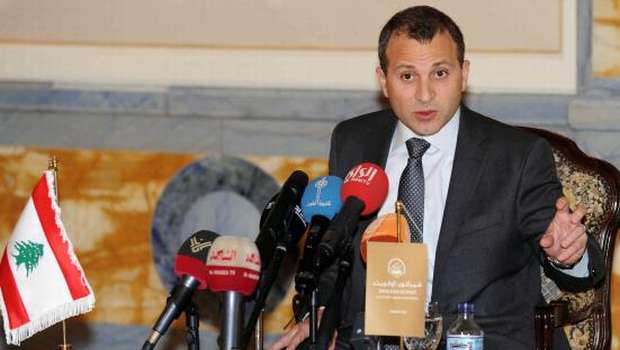
Lebanese Foreign Minister Gebran Bassil speaks during a press conference on March 24, 2014 in Kuwait city as part of his visit to attend the Annual Arab Summit. (AFP Photo/Yasser Al-Zayyat)
Beirut, Asharq Al-Awsat—Lebanese Foreign Minister Gebran Bassil has called on Arab states to work together and take the initiative to fend off Iranian intervention in the region, warning that Tehran will be successful in expanding its influence in the Middle East unless Arab states stand together.
In an interview with Asharq Al-Awsat in the wake of a high-level state visit to Saudi Arabia by Lebanese Prime Minister Tammam Salam, Gebran spoke about the deteriorating political and security situation in the region, particularly the growing presence of the Islamic State of Iraq and Syria (ISIS) and Arab fears of Iranian regional expansion.
“Arab states must not permit this Iranian expansion, they must take the initiative. They are the ones who must do this; nobody else will come and do it for them,” Gebran said.
“If Iran benefits from any inter-Arab failure or division, then it is the Arabs who are primarily responsible for this. I don’t like seeing anyone from outside the region interfere in regional affairs. The main thing is to ensure that there are no spaces [between Arab states] that Iran can exploit,” he added.
Gebran said Iran was using its anti-Israel “resistance” rhetoric as a tool to infiltrate the Arab world and gain supporters. “Iran came to the region to fight Israel, so if the Arabs fought Israel then Iran would not be able to impose its agenda on us.”
“If nobody fights Israel, then those who carry the banner of fighting Israel will be prominent and will find supporters,” he said in an implicit reference to ISIS, which also uses anti-Israel rhetoric to gain followers.
He stressed that the region must stand together in its confrontation of ISIS, adding that targeting the terrorist group should be a priority for all Arab states, rather than Arab governments worrying about the political repercussions of opposing the militants.
“We agree that ISIS are terrorists . . . Whatever conflicts are playing out, we cannot say that this [fighting ISIS] benefits the [Syrian] regime or Hezbollah. ISIS is unlike anything we have seen before. The issue is not that you are fighting ISIS to benefit any other side,” he said.
“The battleground is not just Syria. It is in Iraq and Saudi Arabia and elsewhere,” he added, referencing twin bombings carried out by ISIS that targeted Shi’ite mosques in Saudi Arabia’s Eastern Province over the past two weeks.
The Lebanese foreign minister also took pains to highlight Lebanon’s historic ties with Saudi Arabia, playing down the effect of criticism of the Kingdom from Lebanese political figures, including Hezbollah chief Hassan Nasrallah, on relations between Riyadh and Beirut. Gebran praised the Riyadh leadership for its commitment and concern for Lebanon and Saudi Arabia’s role in “curbing sectarian conflict in the region.”
The Lebanese foreign minister told Asharq Al-Awsat: “Prime Minister Salam’s visit to Riyadh is a new chance for the state of Lebanon to confirm its desire for good relations with Arab states and particularly the Kingdom of Saudi Arabia and to try to reap the benefits of Saudi Arabia’s care and concern for Lebanese stability.”
Without directly referencing Hezbollah and recent statements from within the group that criticized Riyadh, Gebran said: “The Saudi leadership’s ability to overcome some of the statements that have been issued in Lebanon is proof of Saudi Arabia’s love for Lebanon,” adding that, “there is an understanding that Lebanon’s official position is expressed by the government only, and we have not heard any attempts for the Lebanese state to be held responsible [for any negative comments].”
